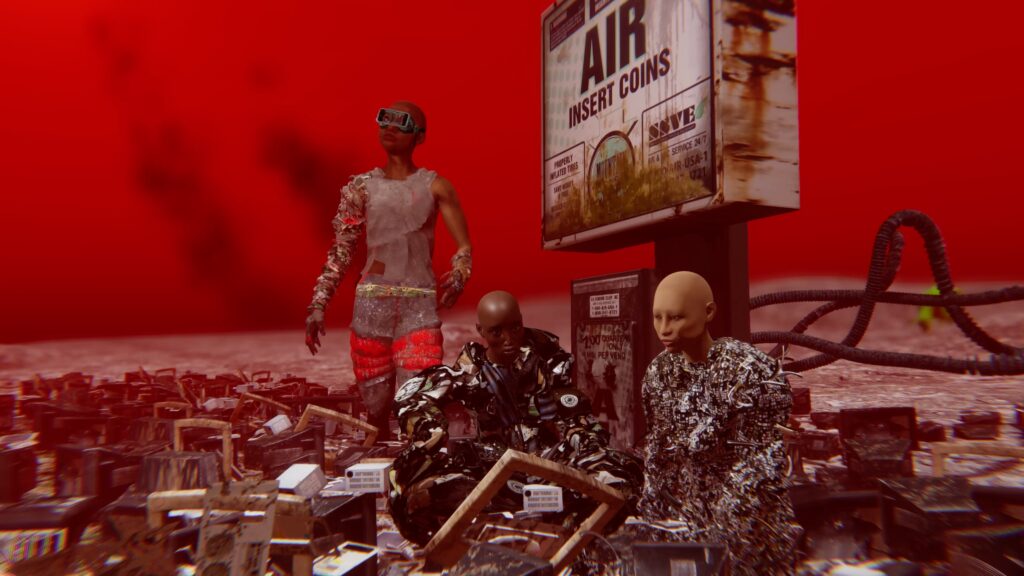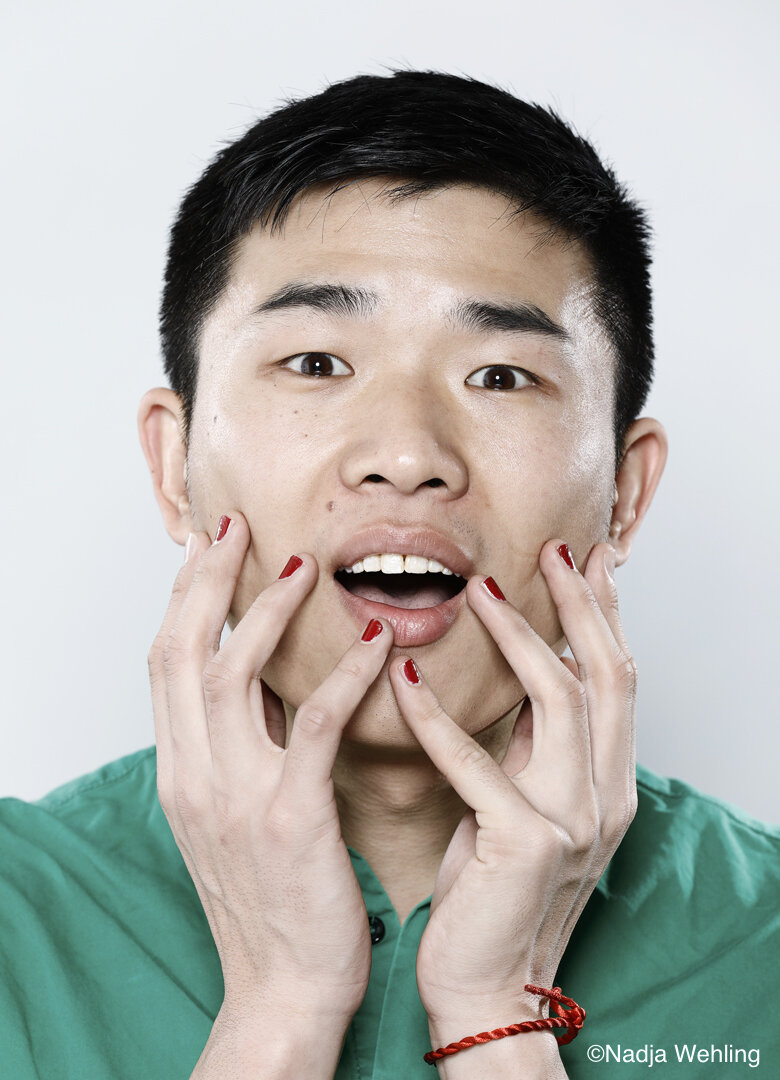
论坛概要 Panel Introduction
“现在是什么时辰了?”我们经常这样问。而对于郑淑丽的作品UKI,我们更好奇“酷儿时间”几点了。作为其作者的“科幻新酷儿电影三部曲”终结篇,影片描绘的混沌年代似乎契合着现在。哲学家保罗·普雷西亚多更评论说淑丽的作品Fluidø乃是用未来作为当下的寓言。而病毒、AI、机器人、无政府主义、电脑游戏、深度伪造等等话题都可能与酷儿议题交织。这次在影片UKI放映之后首先将艺术家的问答作为座谈的一部分,更将邀请另外两位艺术家与学者嘉宾一同探讨一下已然幻觉的当下,以及值得被酷儿化的未来。
“What time is it now?” we often ask ourselves. But Shu Lea Cheang’s UKI makes us wonder: what is the “queer time”? As the third film in the author’s “Sci-fi New Queer Cinema,” it depicts a chaotic future in an intense cinematic language. Philosopher Paul B. Preciado commented that Shu Lea’s work Fluidø uses the future as an allegory for the present. Topics such as viruses, AI, robots, anarchism, computer games, deepfakes, and more intersect with queer issues. After the screening of UKI, the artist’s Q&A will be part of the discussion, and two guest artists and scholars will be invited to fantasize the nowness and queer the future together.
主持人 Moderator
范坡坡 Popo Fan
范坡坡是一位酷儿导演、作者和活动家。作品中影响力最大的莫过于“彩虹家庭三部曲”,包括《柜族》、《彩虹伴我心》、《彩虹伴我行》三部作品关注于同志出柜议题,引起巨大社会反响。除此之外他参与组织北京酷儿影展十余年,也是酷儿大学视频训练营的发起者之一。2012年,香港同志影展授予他“玲珑大奖”以表彰其在同志影像、平权的不懈努力。2017年,他获选参与柏林电影节“天才训练营”。2019,他更担任柏林电影节泰迪熊奖评委。 目前他居住柏林正着力发展自己的剧情长片首作。
Popo Fan is a filmmaker, writer, and activist from China, where his queer documentary films have made a notable impact. Since 2016, he has concentrated on writing and directing scripted, sex-positive shorts. He is the co-founder of the Queer University Video Training Camp and has been an organizer of the Beijing Queer Film Festival for more than a decade. Popo was invited to sit on the jury of the Teddy Award of the Berlinale in 2019. He is currently based in Berlin developing his fictional feature debut.
论坛嘉宾 Panel Guests
美莎 Mesa
美莎,2002年出生在甘肃柳园镇成长于新疆哈密。常以身体行动介入于社会规则探索其边界,现主要以关注性别边界而衍生其余规则。2015年首个行为表演作品《红领巾》,2023年“酷儿解构”社群参与工作坊在北京木兰花开公益组织、乐平基金会开展,同年在上海建立酷儿社群空间“森森之宅”,2024年行为概念《讨论》入围歌德学院(北京)AI竞赛单元,并获得最勇敢前瞻奖,同年在燕郊实践开源展览空间概念“次卧空间”。
Mesa was born in 2002 in Liuyuan, Gansu, and raised in Hami, Xinjiang. She frequently uses the body as a medium to challenge and explore the boundaries of social rules, with a focus on gender-related issues. At the age of 12, Mesa created her first performance art piece, “Red Scarf”. In 2024, her conceptual performance art, “The Discussion”, won the Most Courageous Visionary Award in the AI competition at the Goethe-Institut Beijing. That same year, Mesa participated in the Queer Deconstruction workshop at the Mulan Huakai NGO and Leping Foundation in Beijing, and founded the queer community space “Sensen’s Home” in Shanghai. Additionally, in 2024, she established the open-source exhibition project “Bedroom Space” in Yanjiao.
郑淑丽 Shu Lea Cheang
郑淑丽是一位艺术家和电影人,其作品旨在重新构想性别、类型和操作结构。她通过打破常规的艺术实践挑战现有的操作机制以及社会、地理、政治和经济结构中被强加的界限。郑淑丽以参与性和即兴模式构建网络化装置和多玩家表演。在她的电影场景和艺术想象中,她草拟科幻叙事,并通过跨越界限的情节和开放的网络构建社会界面,允许公众参与。作为网络艺术的先锋,郑淑丽的作品《BRANDON》(1998-1999)是纽约所罗门·R·古根海姆博物馆委托和收藏的第一件网络艺术作品。从90年代的网络空间拓荒到她当前退隐于“后网络崩溃”的“BioNet”区域,郑淑丽在其现阶段的作品中探讨了病毒式的爱情和生物黑客。她代表台湾参加了2019年威尼斯双年展,展示了一个名为《3x3x6》的混合媒体装置。其影像作品包括《鲜杀》、《体液》、《UKI》等。
Shu Lea Cheang is an artist and filmmaker whose work aims to reenvision genders, genres, and operating structures. Her genre bending gender hacking art practices challenge the existing operating mechanisms and the imposed boundaries of society, geography, politics, and economic structures. Cheang constructs networked installation and multi-player performance in participatory impromptu mode. She drafts sci-fi narratives in her film scenario and artwork imagination. She builds social interface with transgressive plots and open network that permits public participation. As a net art pioneer, BRANDON (1998-1999) was the first work of web art commissioned and collected by the Solomon R. Guggenheim Museum in New York. From homesteading cyberspace in the 90s to her current retreat to post-netcrash BioNet zone, Cheang takes on viral love, bio hack in her current cycle of works. She represented Taiwan with 3x3x6, a mixed media installation at Venice Biennale 2019. Her moving image works include “Fresh Kill”, “Fluidø” and “UKI” etc.
Katrien Jacobs
Katrien Jacobs是香港中文大学文化研究的副教授,也是根特大学语言与文化系的副研究员。她专注于数字媒体、当代艺术和网络行动主义中的性别与性议题,曾获得多项香港政府的GRF研究资助,并撰写了四本关于互联网文化和性别/性议题的书籍。她的新书和艺术项目聚焦于深度伪造和人工智能技术对私人和公共生活的影响。2022年,雅各布斯出版了《针锋相对的媒体:政治行动主义中的争议身体与性图像》,分析了中国、香港和欧盟的社交媒体话语,特别是在2018-2020年的抗议时期,揭示了性别化和性化的视觉文化如何影响公众舆论。她的著作《网络色情》(2007)、《人民的色情》(2012)和《后数字中国的女性色情余晖》(2015)分别探索了中国和全球网络文化中的性别政治和性媒体,获得学术界和新闻媒体的广泛关注。雅各布斯同时也是一位艺术家,创作了多部纪录片和行为艺术作品。2024年,她获得了博利亚斯科艺术中心的驻留资格,启动了关于恢复性深度伪造的艺术项目。
Katrien Jacobs is an Adjunct Associate Professor of Cultural Studies at the Chinese University of Hong Kong and an Associate Researcher at the University of Ghent. Her research focuses on gender and sexuality in digital media, contemporary arts, and online activism. She has received several GRF grants from the Hong Kong government and has authored four books on internet culture and gender/sexuality. Her current book and art project critically examine deepfake and AI technology’s impact on private and public life. In 2022, she published Tit-For-Tat Media: The Contentious Bodies and Sex Imagery of Political Activism, analyzing social media discourses in China, Hong Kong, and the EU during the protest years of 2018-2020, focusing on the role of gendered and sexualized imagery in shaping public perception. Her earlier works, Netporn (2007), People’s Pornography (2012), and The Afterglow of Women’s Pornography in Post-Digital China (2015), received critical acclaim for exploring gender politics and sexual media in China and beyond. Jacobs is also an artist, having produced documentaries and performance art. In 2024, she was awarded an art residency at the Bogliasco Center for a project on restorative deepfakes.

